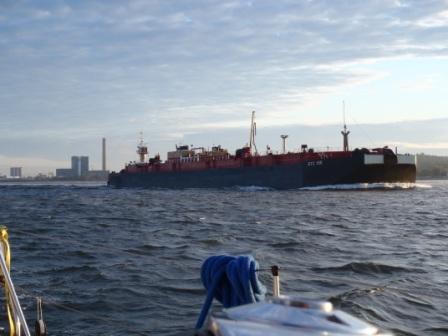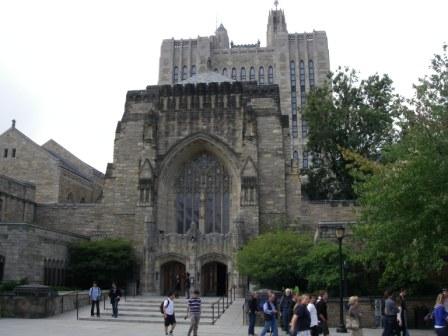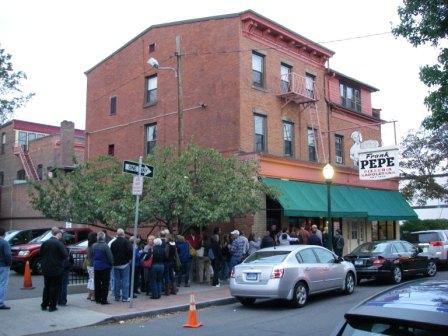New Haven CT "41:17.54N 72:54.79W"

VulcanSpirit
Richard & Alison Brunstrom
Wed 21 Sep 2011 14:58
|
New Haven is the home of Yale University,
(currently 10th in the Times list of the world's 200 best universities, with
Harvard at No.1 and Oxford & Cambridge at equal sixth; the 2011 rankings are
due out on 6 October), and what an interesting place it turned out to be.
The dominating feature as you enter the estuary of the Quinnipiac River is a
large oil terminal, home to the large barges and tugs familiar to anyone who has
sailed the New England coast. Not an auspicious start, but things look up for
some crew members when a large blue building adjacent to our proposed anchoring
site is determined to be an IKEA, complete with advert for ridiculously cheap
Swedish meatballs (a clever and successful loss leader, according to
Kate).
Here we are being overtaken by a barge hurrying up
the very narrow channel to the terminal
 New Haven, founded in the seventeenth century (Yale
is 1701) is rather astonishingly the home not just of Yale, but also of several
important American inventions: the cotton gin, the hamburger, the American-style
pizza, the frisbee and Silly Putty amongst others.
Eli Whitney (d.1825 at New Haven) invented the
cotton gin (short for 'engine') in 1794 as a machine for extracting seeds from
cotton (he claimed to have been inspired by a cat pulling a bird though a
fence). It revolutionised the economy of the southern cotton-growing States and
had the entirely unintended effect of revitalising slavery which had previously
been in decline - many owners including George Washington having given their
slaves away. Ironically slavery, rather surprisingly for a New England town,
came to figure large in New Haven's history again.
The Frisbee Pie company, bakers of Mrs Frisbee's
once famous pies (now long vanished), was based in Bridgeport CT. In the 1920's
Yale students took to throwing the pie tin lids, each stamped with the company's
name, across New Haven's central Green. We have a Frisbee on board, in regular
use. Actually, ours is a dog frisbee; the difference is that the edge is soft
rubber to avoid hurting the poor pooch's mouth and our feeble
fingers.
Yale is a collegiate university like Oxford and
Cambridge, with ten colleges. Students (there are only 5000) live for four years
on the campus. The full cost is $40 000 per year but almost nobody pays that; if
your family assets are less than $60 000 it's free. Here's a typical
quadrangle; it looks an idyllic life:
 And the quite amazing library. The architect and
benefactor wanted to build a church for the university, but the university
wanted a library. So the architect built a church with a library inside. The
entrance hall is simply a cathedral, with Reception where the altar should be.
It is a truly amazing building, unique in the world, and now a fabulous
library.
 And so to the pizzas. Frank Pepe started the
business in 1925 and it's still in the family. His 'tomato pies' are thin crust
pizzas, served on a metal tray (see photo of us tucking in on Kate &
Chris's previous Blog). He is credited with inventing the modern pizza -
everything else worldwide grew from this. The pizzas themselves are very nice,
but not extraordinary. What is extraordinary is their enduring popularity - the
pizza restaurant has become a New Haven icon; here is the queue on a normal
evening. The wait in line is for up to an hour or so.
 And back to slavery. 'La Amistad' was a ship
transporting slaves, newly arrived from Africa, from one port to another in
Cuba in 1839. The Atlantic slave trade was by this time illegal under American
law. The slaves revolted, killed the captain and not unreasonably demanded
to be returned to Africa. The ship's navigator deceived them, and set off up the
US coast eventually to be intercepted by the US Coastguard in Long Island Sound.
The slaves were arrested and imprisoned in New Haven and a hugely important
legal battle commenced which ended in the US Supreme Court
The Court had to decide whether the slaves were
salvage and thus the property of the Navy officers who had arrested them,
property of the Cuban buyers or of the Queen of Spain (as she claimed), or free
people. In a landmark decision of enormous historical significance (so much so
that Stephen Spielberg made a film!) the Court ruled that the slaves had human
rights, and were thus freed and returned to Africa.
That's enough of New Haven; or possibly more than
enough in some readers' minds. Next stop Port Washington NY.
|